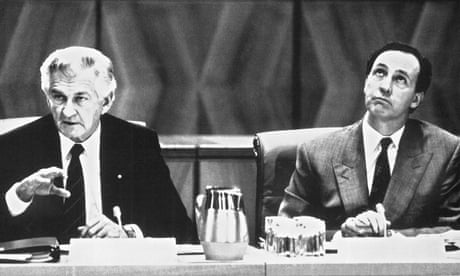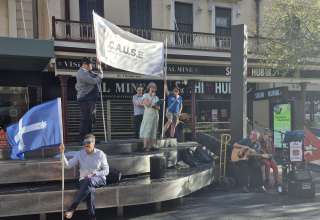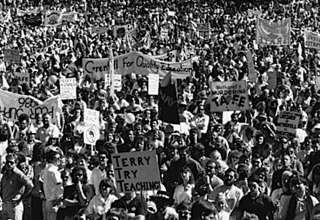The final installment of a three part series of articles by Humphrey McQueen (Read part one here, part two here.)
Free for all
 Throughout the 1970s, the exchange rate had come off the boil. Early in 1983, the $A was at parity with the $US. The incoming Hawke-Keating gang failed to staunch the bleeding. They gave Howard’s de-regulation agenda its biggest boost. Their floating of the dollar in December 1983 set the field for everything that has followed. Only the tip of which is being exposed at the Malpractice Commission. Euromoney magazine named Keating ‘Treasurer of the Year’ in October 1984. Why wouldn’t they?
Throughout the 1970s, the exchange rate had come off the boil. Early in 1983, the $A was at parity with the $US. The incoming Hawke-Keating gang failed to staunch the bleeding. They gave Howard’s de-regulation agenda its biggest boost. Their floating of the dollar in December 1983 set the field for everything that has followed. Only the tip of which is being exposed at the Malpractice Commission. Euromoney magazine named Keating ‘Treasurer of the Year’ in October 1984. Why wouldn’t they?
Keating proved a quick study—too clever by half for the good of working people. He could parrot lines fed to him by the anti-union free-trade Treasury. Whatever happened to his ‘J-curve’?
Un-Funny Money
The deregulated money market powered a torrent of scandals in the Hawke-Keating era.
One was the marketing of loans in foreign currencies by a WESTPAC subsidiary. Their unraveling, and the bank’s own loss of $1.66 billion, had led to the departure of the Bank’s board by late 1992. Judges and ALP pollies tried their damnest to protect WESTPAC from the publication of incriminating letters. The bank took legal action to criminalise an ex-employee’s supplying information to its victims. Killing the whistle-blower is the norm for bosses caught with their hands in the till. Outside the court, Communists sold Tribune which had reprinted the suppressed letters.
Ponzi Premiers
Dullards like ALP premiers John Cain in Victoria and John Bannon in Adelaide bought into the fantasy that making money out of money could redeem their states’ economies after the decline in making physical commodities.
The irrational exuberance infected most sectors of government and the backwaters of business. Geelong-based Pyramid Building Society was converted to a loosey-goosey financier before being bailed out.
Three State ALP administrations put their faith in corporate cowboys: Tim Marcus Clark in Adelaide; Ian Johns in Victoria (later gaoled); and ‘Last Resort’ Laurie Connell in Perth. The State Banks of SA and Victoria switched from lending to home-buyers to chasing borrowers who had been spurned by the commercial banks as too risky. Clients included Bond, Skase and Herscu, the last named having taken over Hookers on his way to prison.
Losses of $2.7 billion State Bank of Victoria and its wayward arm Tricontinental led to a forced sale of the box and dice to the Commonwealth Bank. The Keating Liberals then grabbed at the chance to sell off the Peoples Bank. What should have been a brake on the excesses of the Big Four was set up to become the worst offender.
Perched atop of W.A. Inc. was philatelist and soon-to-be jailbird, ALP’s Brian Burke, held up by Connell’s Rothwells Bank, Alan Bond and Robert Holmes a Court. Their donations through the NSW Right supported Hawke and Keating and protected mining companies from Aboriginal Land Rights.
Banana republicans
Keating bleats about ‘the recession we had to have’ if policy-makers were to drive inflation out of the system. He is as silent as the grave on how inflation went feral. During the early 1990s, the Reserve Bank claimed to be ‘using every arm of policy’ to tame inflation and preserve jobs. It was. Its difficulty was that Keating’s de-regulators had left the Reserve with only one arm: interest-rate hikes. The ALP had lopped off its other limbs. Driving interest-rates up to 18-20 per cent, the Reserve Bank managed to wreck Whelan the Wrecker.
That the economy could not limp along in the ways that it had is incontrovertible. The de-regulators did as much harm, proportionately, to the economy and to social well-being, as had the Stop-Go under Menzies. In Victoria, reaction to the financial fiascos ensured Kennett 1992 victory and the subsequent ruin of education, power supply and transport.
In addition, the ALP’s programme of de-forms paved the way for their deepening under the next bout of Tory rule after 1996 – notably in industrial relations. At the Canberra Hyatt late in 1993, Keating promised the CEO’s of the top corporations to remove all ‘impediments’ – aka the entitlements that workers had fought decades to win. Howard kept that promise with Worst Choices. Gillard kept her tough cop on the block against construction unions and left all wage-slaves under Work Choices Lite in her un-Fair Work Australia.
The outrage expressed by so many Australians at the exposure of malpractices as the Killer Performance Indicators throughout the financial sector has been fired up by forty years of governments’ selling out our interests. We need to change more than the rules around industrial relations if we are to change even those rules.
For some overview of what local and imperial bankers have been up to here during the past 200 years: www.surplusvalue.org.au/mcqueen/political_economy/political_economy_bankers.html




